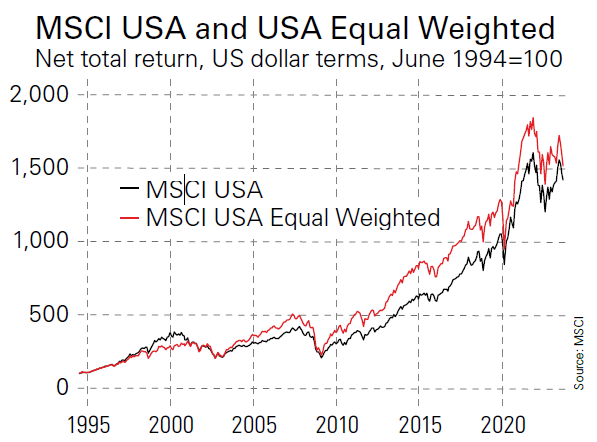Get back in balance with equal-weighted indices
Equal-weighted indices are one way to dilute the influence of mega-cap tech stocks in the US market.


Get the latest financial news, insights and expert analysis from our award-winning MoneyWeek team, to help you understand what really matters when it comes to your finances.
You are now subscribed
Your newsletter sign-up was successful
Want to add more newsletters?

Twice daily
MoneyWeek
Get the latest financial news, insights and expert analysis from our award-winning MoneyWeek team, to help you understand what really matters when it comes to your finances.

Four times a week
Look After My Bills
Sign up to our free money-saving newsletter, filled with the latest news and expert advice to help you find the best tips and deals for managing your bills. Start saving today!
Top-down investors who worry about how much the top seven tech stocks now dominate the US market have two obvious choices.
The first is to avoid US stocks altogether. That may make sense tactically – for example, if you think that the gap between European and US stocks will narrow in the near term. However, for a longer-term asset allocation, it’s a very big decision to hold nothing in a country that accounts for about a quarter of the global economy, has the best record on economic growth and innovation, and shows a long history of delivering superior returns. Realistically, not many global investors are going to do that.
So the alternative is to use alternative weighting schemes – i.e., setting the proportion of each stock in your portfolio according to criteria other than market capitalisation. The simplest of these is equal weighting, where each company accounts for the same share of the index at the start, and is rebalanced back to equal weights at regular intervals (typically quarterly).
MoneyWeek
Subscribe to MoneyWeek today and get your first six magazine issues absolutely FREE

Sign up to Money Morning
Don't miss the latest investment and personal finances news, market analysis, plus money-saving tips with our free twice-daily newsletter
Don't miss the latest investment and personal finances news, market analysis, plus money-saving tips with our free twice-daily newsletter

A tough decade for equal weighting
Over the very long term, equal weighting has tended to beat cap weighting, because it holds more in value shares and in smaller stocks – both of which have outperformed in the past. The last decade has not been kind to it – the big tech giants have kept outstripping the market and growing in influence and equal weighting has leaned against that. However, despite that, the MSCI USA Equal Weighted Index is still slightly ahead of the MSCI USA since 1994 (9.71% per year versus 9.45%), even after lagging by almost 3.5 percentage points per year over the past five years.
Index returns don’t always match well with what investors earn, due to trading fees, spreads and taxes, and equal weighting has a much higher turnover than cap weighting. So we need to see if products are able to track the benchmark closely.
The main option for UK investors is the Xtrackers S&P 500 Equal Weight (LSE: XDWE), whose annualised return over five years is 9.83% per year compared to a benchmark of 9.78% – ie, a very close tracking difference. Investors who want to favour US tech yet underweight the giants could consider the Invesco NASDAQ-100 Equal Weight ETF (LSE: EWQX), but this is a new fund and so we can’t check the tracking history (although there’s no obvious reason why it should be worse).
So should we employ an equal-weight fund for the US in our asset allocation strategy? There’s one argument against it: our portfolio is already weighted towards markets that we think offer greater value (Japan, emerging markets, Europe). Keeping a mega-cap tech bias in the S&P 500 may help balance our value approach against the tail risk that these firms keep growing to dominate the world economy due to breakthroughs in fields such as artificial intelligence. Set against that, valuations for big tech look stretched and history implies equal weighting may work well from here. So this is an option we’ll consider carefully once we’ve reviewed the rest of our positions.
This article was first published in MoneyWeek's magazine and all information was correct at the time of writing. Enjoy exclusive early access to news, opinion and analysis from our team of financial experts with a MoneyWeek subscription.
Related articles
- 5 top UK tech stocks
- 5 top tech stocks to boost your investment portfolio
- How to find the market’s “multi-bagger” stocks
Get the latest financial news, insights and expert analysis from our award-winning MoneyWeek team, to help you understand what really matters when it comes to your finances.

Cris Sholt Heaton is the contributing editor for MoneyWeek.
He is an investment analyst and writer who has been contributing to MoneyWeek since 2006 and was managing editor of the magazine between 2016 and 2018. He is experienced in covering international investing, believing many investors still focus too much on their home markets and that it pays to take advantage of all the opportunities the world offers.
He often writes about Asian equities, international income and global asset allocation.
-
 Early signs of the AI apocalypse?
Early signs of the AI apocalypse?Uncertainty is rife as investors question what the impact of AI will be.
-
 Reach for the stars to boost Britain's space industry
Reach for the stars to boost Britain's space industryopinion We can’t afford to neglect Britain's space industry. Unfortunately, the government is taking completely the wrong approach, says Matthew Lynn
-
 Early signs of the AI apocalypse?
Early signs of the AI apocalypse?Uncertainty is rife as investors question what the impact of AI will be.
-
 8 of the best properties for sale with beautiful kitchens
8 of the best properties for sale with beautiful kitchensThe best properties for sale with beautiful kitchens – from a Modernist house moments from the River Thames in Chiswick, to a 19th-century Italian house in Florence
-
 Three key winners from the AI boom and beyond
Three key winners from the AI boom and beyondJames Harries of the Trojan Global Income Fund picks three promising stocks that transcend the hype of the AI boom
-
 RTX Corporation is a strong player in a growth market
RTX Corporation is a strong player in a growth marketRTX Corporation’s order backlog means investors can look forward to years of rising profits
-
 Profit from MSCI – the backbone of finance
Profit from MSCI – the backbone of financeAs an index provider, MSCI is a key part of the global financial system. Its shares look cheap
-
 'AI is the real deal – it will change our world in more ways than we can imagine'
'AI is the real deal – it will change our world in more ways than we can imagine'Interview Rob Arnott of Research Affiliates talks to Andrew Van Sickle about the AI bubble, the impact of tariffs on inflation and the outlook for gold and China
-
 Should investors join the rush for venture-capital trusts?
Should investors join the rush for venture-capital trusts?Opinion Investors hoping to buy into venture-capital trusts before the end of the tax year may need to move quickly, says David Prosser
-
 Food and drinks giants seek an image makeover – here's what they're doing
Food and drinks giants seek an image makeover – here's what they're doingThe global food and drink industry is having to change pace to retain its famous appeal for defensive investors. Who will be the winners?